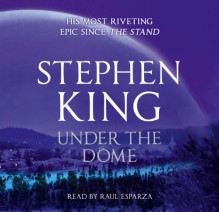The achievement of Stephen King is unlike that of any writer. He has taken a genre which was somewhat moribund when he came to it -- the horror novel -- and transformed it into one of the most phenomenally successful areas for quality popular writing -- what's more, his unprecedented sales...
show more
The achievement of Stephen King is unlike that of any writer. He has taken a genre which was somewhat moribund when he came to it -- the horror novel -- and transformed it into one of the most phenomenally successful areas for quality popular writing -- what's more, his unprecedented sales success has inspired hundreds of imitators, and while few can match his inspiration (or, for that matter, his jawdropping productivity), there is no question that he has rejuvenated the horror field. Not that King confined himself to the strict parameters one might associate with the genre; several of his books -- such as this latest one, The Dome, stray into science fiction territory). But King’s achievement doesn't end there -- such is his influence over other genres (notably the crime and thriller field) that writers in those genres have been obliged to up the ante in terms of gruesome compulsiveness (Thomas Harris’ Hannibal Lecter books, for instance, owe much to the King transformation of the popular literature field). And as for that loaded world – ‘literature’ -- isn't Stephen King reputed to be the author who has brought quality writing into a field not noted for such things? (Not, that is, since the halcyon days of Edgar Allen Poe in a previous century). Is that claim true of the new book?So... The Dome. This massive novel, 25 years in the writing (if Stephen King is to be believed), is quite his most ambitious project, and brings to mind earlier blockbuster novels which aficionados considered to be among the writer's best work. Something like the basic premise here may be found in a classic piece of British science fiction, John Wyndham’s The Midwich Cuckoos (filmed as Village of the Damned). In that book, a village is isolated by an invisible force field -- and in the King novel, the residents can no more get out than the outside world can enter. John Wyndham's narrative involved the insemination of the women in the town by unseen alien presences, but Stephen King in The Dome has chosen to work in a different area. When the small New England town of Chester's Mill is cut off from the outside world by a mysterious force, all the laws of physics seem to be up for grabs; cars leaving town come up against invisible barriers, and there is death and mutilation for whatever was caught in the boundaries of an invisible field. Inside the dome, the inhabitants of the town deal with the catastrophe in a surprising (and often alarming) variety of ways: ex-military hero Dale Barbara has already come up against the antisocial elements of the town, and has been trying to get out. But the self-styled boss of the town, the demagogue Big Jim Rennie, soon establishes a Machiavellian control (another echo of the books of John Wyndham, in which catastrophe always throw up vicious, fascist-style leaders who capitalise on the disaster).As ever, King develops his massive dramatis personae with great assurance, and demonstrates once again that his imagination in terms of plotting is as strong as ever. Those, however, who have made a case for King as a quality writer rather than a great popular entertainer will not find much ammunition for their arguments here, but this great sprawling canvas affords many pleasures. --Barry Forshaw
show less

